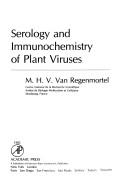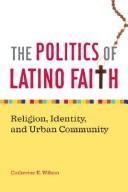| Listing 1 - 7 of 7 |
Sort by
|

ISBN: 0127141804 Year: 1982 Publisher: New York, NY ; London : Academic Press,
Abstract | Keywords | Export | Availability | Bookmark
 Loading...
Loading...Choose an application
- Reference Manager
- EndNote
- RefWorks (Direct export to RefWorks)
SEROLOGICAL TESTS --- CLASSIFICATION --- IDENTIFICATION SYSTEMS --- IMMUNOGENICITY --- VIRUSES --- QUATERNARY STRUCTURE --- PREPARATION --- ANTISERA --- PURIFICATION --- ANTIBODIES --- ANTIGENS --- IMMUNOCHEMISTRY --- SEROLOGY --- METHODS --- ANALYSING --- PLANT VIRUSES
Book
Year: 1960 Publisher: Paris : Gauthier-Villars,
Abstract | Keywords | Export | Availability | Bookmark
 Loading...
Loading...Choose an application
- Reference Manager
- EndNote
- RefWorks (Direct export to RefWorks)
PROTEINS --- SPECTROSCOPIC ANALYSIS --- CHEMICAL REACTIONS --- ANALYSING --- TOPOCHEMISTRY --- PURINES --- VITAMINS --- UREA --- AMINES --- MINERAL SALTS --- PIGMENTS --- ENZYMES --- LIPOPROTEINS --- MUCOPROTEINS --- GLYCOPROTEINS --- LIPIDS --- CARBOHYDRATES --- MANUALS --- LABORATORIES --- CYTOCHEMISTRY --- HISTOCHEMISTRY --- ANIMALS --- AUTORADIOGRAPHY --- X-RAY SPECTROSCOPY --- NUCLEIC ACIDS
Book
ISBN: 0713128445 9780713128444 Year: 1982 Publisher: London: Edward Arnold,
Abstract | Keywords | Export | Availability | Bookmark
 Loading...
Loading...Choose an application
- Reference Manager
- EndNote
- RefWorks (Direct export to RefWorks)
Growth (Plants) --- plantenteelt --- groei --- Plant growth --- Plants --- Growth --- Plant physiology --- Meristems --- Plant growth-promoting rhizobacteria --- Rejuvenescence (Botany) --- Development --- Plant and Crop Sciences. Botany --- Plant Physiology --- Plant Growth --- Growth (Plants). --- Plant Growth. --- Computer programming. --- Mathematical models. --- Analysing --- Curve fitting --- Growth curves --- Statistical analysis

ISBN: 9780814799567 0814799566 9780814799574 0814799574 Year: 2008 Publisher: New York: New York University press,
Abstract | Keywords | Export | Availability | Bookmark
 Loading...
Loading...Choose an application
- Reference Manager
- EndNote
- RefWorks (Direct export to RefWorks)
Dreams --- Religions --- Religious aspects --- History. --- -Religions --- -291 --- 159.963 --- 159.963 Slapen en dromen. Slapeloosheid. Dagdromen. Slaapwandelen --- Slapen en dromen. Slapeloosheid. Dagdromen. Slaapwandelen --- Comparative religion --- Denominations, Religious --- Religion, Comparative --- Religions, Comparative --- Religious denominations --- World religions --- Civilization --- Gods --- Religion --- Dreaming --- Subconsciousness --- Visions --- Sleep --- -History. --- Godsdienstwetenschap: vergelijkend --- 291 --- Religious aspects&delete& --- History --- Dreams - Religious aspects - History. --- Religions - History. --- dreaming --- world religions --- analysing dreams --- religion and dreams --- cognitive neuroscience --- evolutionary psychology --- religious history --- sacred texts --- iconoclasm
Book
ISBN: 3030711471 3030711463 Year: 2022 Publisher: Bern Springer Nature
Abstract | Keywords | Export | Availability | Bookmark
 Loading...
Loading...Choose an application
- Reference Manager
- EndNote
- RefWorks (Direct export to RefWorks)
This open access book focuses on the role of civil society in the creation, dissemination, and interpretation of knowledge in geographical contexts. It offers original, interdisciplinary and counterintuitive perspectives on civil society. The book includes reflections on civil and uncivil society, the role of civil society as a change agent, and on civil society perspectives of undone science. Conceptual approaches go beyond the tripartite division of public, private and civic sectors to propose new frameworks of civic networks and philanthropic fields, which take an inclusive view of the connectivity of civic agency across sectors. This includes relational analyses of epistemic power in civic knowledge networks as well as of regional giving and philanthropy. The original empirical case studies examine traditional forms of civic engagement, such as the German landwomen’s associations, as well as novel types of organizations, such as giving circles and time banks in their geographical context. The book also offers insider reflections on doing civil society, such as the cases of the Umbrella Movement in Hong Kong, epistemic activism in the United States, and the #FeesMustFall movement in South Africa.
Human geography --- Political science & theory --- Open access --- Analysing Civil Society --- Civil Society Associations --- Civil and Uncivil Society --- Civil Society as a Change Agent --- Civil Society Knowledge Networks --- Civil Society Networks --- Civil Society Research --- Collaborative Philanthropists --- Emerging Technologies --- Epistemic Communities and Activism --- FeesMustFall Movement --- Geography of Civil Society --- Geography of Philanthropy and Giving Circles --- Knowledge, Space, and Civil Society --- LandWomen’s Associations --- Smart Cities --- Social movements
Book
ISBN: 9783030711474 3030711471 Year: 2022 Publisher: Cham Springer International Publishing :Imprint: Springer
Abstract | Keywords | Export | Availability | Bookmark
 Loading...
Loading...Choose an application
- Reference Manager
- EndNote
- RefWorks (Direct export to RefWorks)
This open access book focuses on the role of civil society in the creation, dissemination, and interpretation of knowledge in geographical contexts. It offers original, interdisciplinary and counterintuitive perspectives on civil society. The book includes reflections on civil and uncivil society, the role of civil society as a change agent, and on civil society perspectives of undone science. Conceptual approaches go beyond the tripartite division of public, private and civic sectors to propose new frameworks of civic networks and philanthropic fields, which take an inclusive view of the connectivity of civic agency across sectors. This includes relational analyses of epistemic power in civic knowledge networks as well as of regional giving and philanthropy. The original empirical case studies examine traditional forms of civic engagement, such as the German landwomen’s associations, as well as novel types of organizations, such as giving circles and time banks in their geographical context. The book also offers insider reflections on doing civil society, such as the cases of the Umbrella Movement in Hong Kong, epistemic activism in the United States, and the #FeesMustFall movement in South Africa.
Open access --- Analysing Civil Society --- Civil Society Associations --- Civil and Uncivil Society --- Civil Society as a Change Agent --- Civil Society Knowledge Networks --- Civil Society Networks --- Civil Society Research --- Collaborative Philanthropists --- Emerging Technologies --- Epistemic Communities and Activism --- FeesMustFall Movement --- Geography of Civil Society --- Geography of Philanthropy and Giving Circles --- Knowledge, Space, and Civil Society --- LandWomen’s Associations --- Smart Cities --- Social movements --- Human geography --- Political science & theory
Book
ISBN: 3030910172 3030910164 Year: 2022 Publisher: Cham : Springer International Publishing : Imprint: Springer,
Abstract | Keywords | Export | Availability | Bookmark
 Loading...
Loading...Choose an application
- Reference Manager
- EndNote
- RefWorks (Direct export to RefWorks)
This open access book addresses communicative aspects of the current COVID-19 pandemic as well as the epidemic of misinformation from the perspective of argumentation theory. Argumentation theory is uniquely placed to understand and account for the challenges of public reason as expressed through argumentative discourse. The book thus focuses on the extent to which the forms, norms and functions of public argumentation have changed in the face of the COVID-19 pandemic. This question is investigated along the three main research lines of the COST Action project CA 17132: European network for Argumentation and Public PoLicY analysis (APPLY): descriptive, normative, and prescriptive. The volume offers a broad range of contributions which treat argumentative phenomena that are directly related to the changes in public discourse in the wake of the outburst of COVID-19. The volume additionally places particular emphasis on expert argumentation, given (i) the importance expert discourse has had over the last two years, and (ii) the challenges that expert argumentation has faced in the public sphere as a result of scientific uncertainty and widespread misinformation. Contributions are divided into three groups, which (i) examine various features and aspects of public and institutional discourse about the COVID-19 pandemic, (ii) scrutinize the way health policies have been discussed, debated, attacked and defended in the public sphere, and (iii) consider a range of proposals meant to improve the quality of public discourse, and public deliberation in particular, in such a way that concrete proposals for argumentative literacy will be brought to light. Overall, this volume constitutes a timely inquiry into all things argumentative in pandemic discourse. This volume is of interest to a broad readership including philosophers, linguists, communication and legal scholars, and members of the wider public who seek to better understand the discourse surrounding communicative phenomena in times of crisis.
Philosophy of language --- linguistics --- Society & social sciences --- Media studies --- Argument Propagation --- Fake News Propagation --- Argumentation Covid --- Misinformation Pandemic --- Conspiracy Theory Covid --- Argumentative Literacy --- Public Debate --- Trust/Mistrust in Science --- Public Health Discourse --- Political Interference and Argumentative Styles --- Metalinguistic Arguments on What Counts As “Covid-19 Death” --- Evaluative Component in Pragmatic Argumentation --- public Discourse First Wave Sars-Cov-2 Pandemic in Italy --- Controversies and Dispute in France During the Covid-19 Crisis --- Analysing the Public Debate About Lockdown --- Responding to the COVID Conspiracy Theories --- Why Narratives are More Powerful Arguments than Fact-Checking --- Expanded Understanding of the Role of Analogy --- Argumentative Dark Side of Pandemic Discourse --- Open Access --- Language and languages—Philosophy. --- Linguistics—Methodology. --- Social sciences. --- Communication. --- Philosophy of Language. --- Research Methods in Language and Linguistics. --- Society. --- Media and Communication. --- Communication, Primitive --- Mass communication --- Sociology --- Behavioral sciences --- Human sciences --- Sciences, Social --- Social science --- Social studies --- Civilization
| Listing 1 - 7 of 7 |
Sort by
|

 Search
Search Feedback
Feedback About UniCat
About UniCat  Help
Help News
News